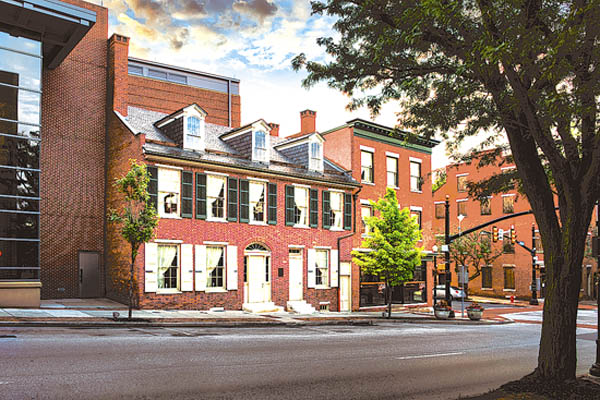LancasterHistory Receives $150,000 For Stevens And Smith Historic Site
Local And Federal Grants To Be Used For Historic Site Planning Process
LancasterHistory's project to plan for the future development of the Thaddeus Stevens and Lydia Hamilton Smith historic site was one of three planning grants awarded in the NEH Historic Places category. LancasterHistory will receive $75,000 to help offset costs associated with an extensive interpretive and master planning process that will ensure the successful completion of a future museum and history center at the Stevens and Smith Site. In the museum field, the support of the NEH is akin to the Good Housekeeping Seal of Approval, said LancasterHistory Vice President Robin Sarratt. Receiving such a highly competitive grant is a ringing endorsement of the work were doing. Beyond the financial support, for which were deeply grateful, this grant carries the added weight of being from the largest federal entity dedicated to supporting cultural institutions across the nation.
LancasterHistory has additional cause for celebration. The Lancaster-based High Foundation awarded LancasterHistory an additional $75,000 grant for the site planning effort. Funds from both the High Foundation and the NEH will be instrumental in bringing together a top-notch advisory council of scholars, museum professionals, educators, and consultants from throughout the country to lay the interpretive framework for the historic site. Additionally, the planning process will include a community advisory council that will engage in a participatory process of linking the historic site closely with the surrounding neighborhoods in Lancaster Citys Southeast. "We are delighted to see the seeds for this project planted," says High Foundation board chair, S. Dale High. "Were proud to support the work of LancasterHistory, especially as they move toward the creation of a museum and historic site dedicated to sharing the legacy of these two remarkable Americans. Its an exciting prospect to envision a new, high-caliber museum of history and civil rights in the heart of Lancaster City.
LancasterHistory will use the total awarded funds to plan for the creation of the Thaddeus Stevens and Lydia Hamilton Smith Historic Site, whose key components will be the interior restoration and interpretation of the law office of Congressman Thaddeus Stevens and the home he shared with Lydia Hamilton Smith, as well as a thorough reconsideration of the roles played by Thaddeus Stevens, Lydia Hamilton Smith, and the surrounding Lancaster community in the national network of freedom seekers known as the Underground Railroad. Also, new interpretive galleries examining the legacies of Stevens and Smith regarding the creation and passage of the 13th, 14th, and 15th amendments to the U.S. Constitution, the Civil Rights Movement of the 20th century, which was built upon those amendments, African American female entrepreneurship in 19th-century America, and the preservation of free public education in the Commonwealth of Pennsylvania are planned.
These planning grants will support costs associated with the creation of an interpretive and master plan for the site, guided by both a community advisory council and a humanities advisory council. We are thrilled to have the support of both the NEH and the High Foundation for this early stage of the project; it reflects both the national and local significance of the contributions of Stevens and Smith to the American story, said LancasterHistory President and CEO Tom Ryan. On a national level, Congressman Thaddeus Stevens laid the foundation for the Civil Rights Movement of the 20th century by his role in the creation and passage of the 13th, 14th, and 15th Amendments to the U.S. Constitution. These were groundbreaking in that together they outlawed slavery, granted citizenship to all native born or naturalized individuals, provided equal protection under the law, and gave the vote to all African American adult males. Locally, the story of Stevens and Lydia Hamilton Smith is one of commitment to equality, freedom, and education. These are two Lancastrians of whom we can all be immensely proud.
LancasterHistory anticipates the planning phase of the Stevens and Smith Historic Site project to continue throughout 2019, followed by the launch of a capital campaign in 2020. "When LancasterHistory assumed responsibility for the site in 2010, we were in the middle of a major capital and endowment campaign and construction project," says Ryan. "We committed then to begin the process of raising funds in 2020. We are right on track." Ryan also noted, The community should also be grateful for the past work of the Historic Preservation Trust of Lancaster County for ensuring the survival of these buildings and restoring their exteriors.
About the Stevens and Smith Site
The historic centerpiece of the Stevens and Smith Site is the 19th-century residence and law office of Thaddeus Stevens at 45 S. Queen St. in Lancaster. A subterranean area behind his home contains an excavated cistern and yard from which more than 100,000 archaeological items were recovered. Stevens purchased the property in 1843 when he moved to Lancaster to practice law.
About Thaddeus Stevens
Thaddeus Stevens (1792-1868), a powerful statesman, fought in Congress and in the courtroom for the abolition of slavery and for the equality of Americans of African descent in the decades prior to and during the Civil War, and in the era of Reconstruction. His legacy is aligned with two of the great reforms of the 19th century: the establishment of free public education and the codification of the principle of equality before the law for all Americans, regardless of race. Recent research has confirmed the long-held conviction of Stevens active involvement in the Underground Railroad, assisting fugitive slaves by harboring them at his Lancaster, Pa., property at 45 S. Queen St.
About Lydia Hamilton Smith
An accomplished African American businesswoman in her own right, as Stevens house manager and confidant for 20 years, Lydia Hamilton Smith helped shape Stevens philosophy toward equal rights and strengthened his abhorrence of slavery. Smith worked with Stevens to help enslaved people escape to freedom using the network of the Underground Railroad. Following Stevens death, she prospered as an entrepreneurial woman, an accomplishment made all the more remarkable by the fact that she was a black woman in a largely segregated society. Smiths story provides a unique opportunity to explore the lives of women, especially enterprising black women, in 19th-century America.
LancasterHistory engages and educates the public about the people, places, and events that shaped Lancaster County within the broader context of the history of the Commonwealth of Pennsylvania and the United States of America. As custodians of a complex past, LancasterHistory collects, preserves, exhibits, and makes accessible materials chronicling Lancaster Countys past as they seek to engage audiences in multi-layered stories of that past.






